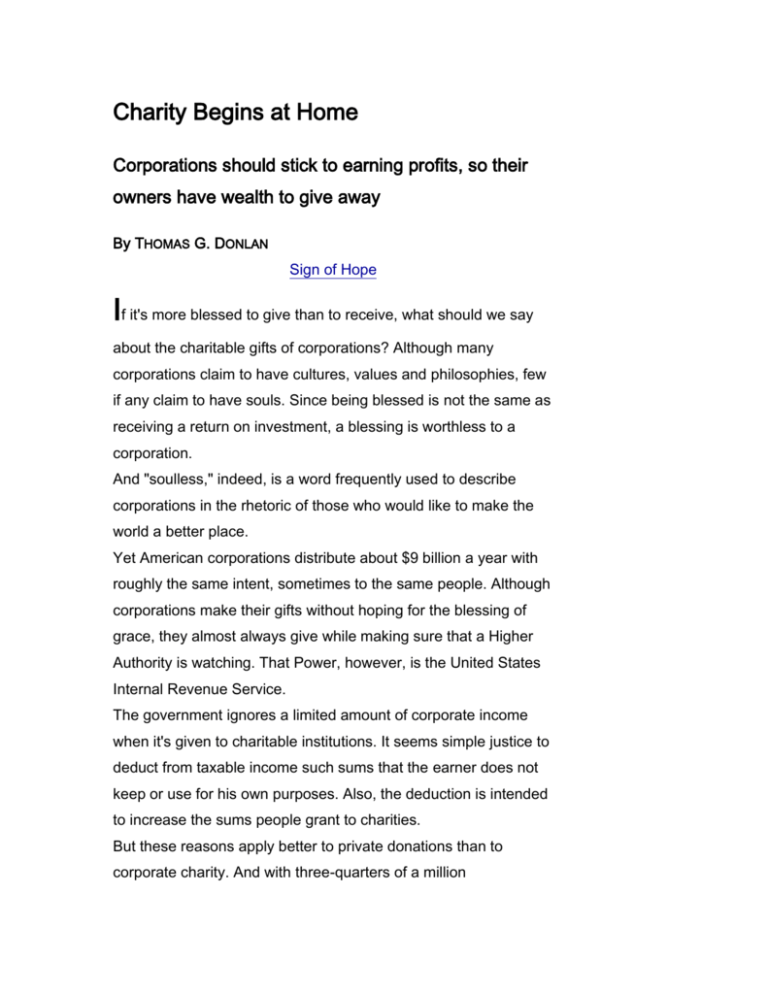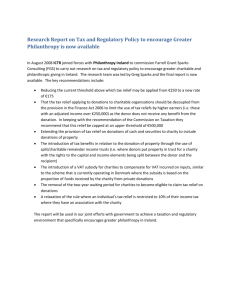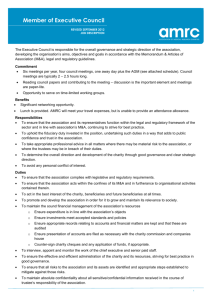
Charity Begins at Home
Corporations should stick to earning profits, so their
owners have wealth to give away
By THOMAS G. DONLAN
Sign of Hope
If it's more blessed to give than to receive, what should we say
about the charitable gifts of corporations? Although many
corporations claim to have cultures, values and philosophies, few
if any claim to have souls. Since being blessed is not the same as
receiving a return on investment, a blessing is worthless to a
corporation.
And "soulless," indeed, is a word frequently used to describe
corporations in the rhetoric of those who would like to make the
world a better place.
Yet American corporations distribute about $9 billion a year with
roughly the same intent, sometimes to the same people. Although
corporations make their gifts without hoping for the blessing of
grace, they almost always give while making sure that a Higher
Authority is watching. That Power, however, is the United States
Internal Revenue Service.
The government ignores a limited amount of corporate income
when it's given to charitable institutions. It seems simple justice to
deduct from taxable income such sums that the earner does not
keep or use for his own purposes. Also, the deduction is intended
to increase the sums people grant to charities.
But these reasons apply better to private donations than to
corporate charity. And with three-quarters of a million
philanthropic institutions in the U.S. receiving private donations
totaling more than $140 billion a year from individuals, we can
afford to question the wisdom of the corporate charity deduction.
A Matter of Property
Corporate contributions to charity are wrong, for the same
reasons that forced political contributions from employees and
union members are wrong. Corporate wealth does not belong to
management, it belongs to shareholders. Choosing a charity or a
candidate is a personal action, and a soulless group such as a
corporation or union should not take that choice away from its
owners or members.
Many companies that say they do understand whose money it is
still do not shy from making large charity donations -- they just file
them under advertising and promotion, and brag about them
under the heading "strategic philanthropy." Charities are noticing
that their corporate donors are more aggressive about splattering
their names on anything the cause has in public view, and vice
versa, putting the charity's name on corporate ads as a sort of
endorsement. It makes no difference that toiletries have nothing
to do with endangered species. Everybody likes animals and
maybe the toiletry company can use that to help people like their
products. So a toiletry company might pay to put the World
Wildlife Fund in its ads.
(Defending corporate interests also seems to require strategic
philanthropy. Beleaguered pharmaceutical companies scramble
to figure out ways to give drugs to African AIDS victims rather
than be labeled soulless killers for wanting to concentrate on
selling their products at higher prices in rich nations.)
But such expenditures do not need to be counted as charity. If
they are wise uses of the shareholders' money, then they will be
tax deductible as ordinary business expenses.
Charity is something different; it's an expenditure on which the
giver expects no real return. And that's what a corporation should
never do intentionally.
Empowerment for Extortion
Tax deductions for charitable contributions also empower
extortion rackets like the Wall Street Project, run by the Rev.
Jesse Jackson. In recent weeks, enterprising newspapers have
reported that his Citizenship Education Fund and its affiliates on
Wall Street, LaSalle Street and in Silicon Valley have taken large
contributions from corporations they criticized, then went silent on
opposition to hiring and merger plans they had opposed.
Sounding like a U.S. Senator defending campaign contributions,
Jackson last week told one newspaper that "The same people
that you challenge one day, once they come around and honor
the law, then we build relationships with them. Of course that's
what we do. It is legal, appropriate and effective." He added, with
the sonorous wisdom of a Godfather, "Those who benefit,
contribute."
The difference between this operation and a protection racket lies
mainly in the style of the threat. Instead of receiving visits from
leg-breakers, those who defy Jackson's shakedown operation are
punished by the sight of their corporate headquarters on the
evening news, surrounded by angry demonstrators who charge
that the company is the embodiment of evil.
Jackson, of course, wishes to advance the fortunes of minorities,
a worthy goal and one for which the tactics of demonstrating
public indignation were honed in the days of the civil rights
struggle in the 'Sixties and 'Seventies. The Wall Street Project, he
has said, is "a matured version" of Operation Breadbasket, which
he ran in Chicago 30 years ago to open jobs to blacks.
But the tactics applied successfully to governments and small
businesses for the benefit of needy individuals are too easily
perverted when they are applied to large corporations -- as with
the fortunes of Jackson, his family and his friends.
For example, Jackson put Anheuser-Busch into his spotlight a few
years ago, noting with appropriate disdain that there were no
African-American distributors of Budweiser beer. Thanks to his
efforts, there now are several African-Americans enjoying the
regional monopolies that the company has created. Unfortunately
for Jackson's reputation as an idealist, two of his sons received a
lucrative distributorship in Chicago, though they lacked previous
experience in the beer business.
The Citizenship Education Fund and other affiliated groups
opposed the merger of Ameritech and SBC Communications
(claiming it was detrimental to low-income customers), until a
Jackson friend's investment partnership was invited to join a
group buying part of Ameritech's mobile phone franchise. SBC
also became one of the largest contributors to Jackson
organizations.
Such gifts are not always tax deductible, and even without a tax
break corporations are likely to conclude that danegeld is cheaper
than war. But the tax deduction for corporate contributions puts
the government on the side of extortionists when it should at least
be neutral.
The Bush administration, unfortunately, is headed in the wrong
direction. The new budget proposes raising the limit on
deductions for corporate contributions.
The best way for corporations to give to charity is to pay profits to
their owners and employees. And the best way for the
government to encourage corporate philanthropy is to eliminate
the corporate deduction while permitting deductions for dividends
and bonuses that recipients use for their own charitable purposes.
Failing such legislative reform, there's a substitute mechanism for
corporate giving that is simple and already widely used.
Corporations that wish to make altruistic donations from earnings
should not make their own choices. They should match the
private donations of employees and shareholders. Such a policy
would be more blessed than direct gifts.
Sign of Hope
California makes progress by raising electric rates
Several weeks ago, California Gov. Gray Davis declared that he
could solve his state's electricity crisis in a matter of minutes if he
were willing to let rates rise. Although we had previously
considered the governor to be an "economic idiot," it now
appeared that he was more obstinate than stupid. That was a real
improvement, for stubborn people occasionally change their
minds, while idiots generally have very little of a mind to change.
Last week, the governor did not exactly change his mind, but at
least he started using it a little. He did not oppose the California
Public Utilities Commission's approval of a rate increase and
hinted that he might endorse it eventually. Even better, the rate
increase was designed for conservation, by letting the highest
rates fall on those who use the most electricity.
Not everyone appreciates the rate increase, however. "This is like
giving crack to an addict," said Harvey Rosenfield, president of
the Foundation for Taxpayer and Consumer Rights in the
People's Republic of Santa Monica. He meant that raising rates
would stimulate out-of-state power generators to gouge more of
the people's money, but he had it exactly backward: California
politicians have been pushing cheap electricity, and higher prices
should reduce demand for the drug.
Editorial Page Editor Thomas G. Donlan receives e-mail at
tg.donlan@barrons.com
Return to top of page | Format for printing
Copyright © 2001 Dow Jones & Company, Inc. All Rights Reserved.
Copyright and reprint information.








